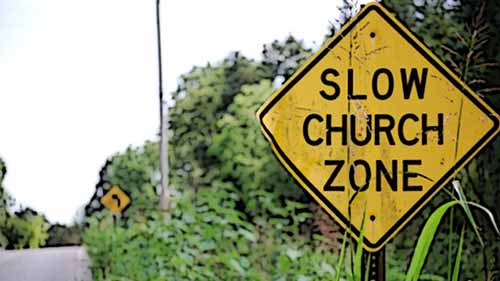
There are lots of wonderful “slow” movements: from slow food to slow sex. Now I fell over a an article about The Slow Professor, challenging what they call the “frantic pace” of contemporary university life.
And it made me think about priesthood. Maybe I should write a book, The Slow Priest. Not wanting to be clericalist, I think the point applies to all Christians and to churches. My own attention-deficit Church lurches from one programme to the next that promises more bums on pews (more money in the plate) and is endlessly filling time with meetings and activities. Clergy are forever bowing to the idol of “creativity,” spending a significant part of the week constructing creative services. Not to mention other hours spent in the office (and by “office” here, I don’t mean Daily Prayer). Busy. Busy. Busy.
The liturgical response to, “How’s things?” is “Oh, you know, really busy.”
I dare you to respond to, “How’s things?” with “My work (my ministry) is just great: I get so much time to reflect, and pray, and just be with people, and just do nothing.” I DARE you. And let me know the response.
Oh – and don’t pretend. Live like that!
Committed Christians spend time at church, and in committees, and home-groups, and decision-making bodies…
I wish I could remember or re-find the statistic – it was something like 35% of all that Kiwis do is a waste of time: paper-shuffling and form-filling and doing stuff that had no fruitfulness whatsoever. And part of the NZ high level of depression (and ultimately, high rate of suicide) was attributed to people realising the pointlessness of what they were doing – particularly those people whose whole employment was taken up at this level of pointlessness.
So this post is, yet once again, an invitation (a challenge) [including to myself] to… do nothing… regularly… often. To start from the “why?” rather than from the “what?” and the “how?” So that clergy and Christians generally become counter-cultural. That “busy” is seen as one of our sins (along with gluttony, etc). That we don’t just accept “busy” as the appropriate response to “How’s things?” but that we react to that response in the same manner as we would if someone had said, “I’m stealing from the collection plate” or “I’m spreading lies about the archdeacon.”
I challenge Christians to be part of a contemplative community.
Here’s a second post on a contemplative community 2.
Read about contemplative leadership.
And here I write about forming such contemplative leadership.
If you appreciated this post, do remember to like the liturgy facebook page, use the RSS feed, and sign up for a not-very-often email, …



I’m going with a half-dozen people from my church, including the vicar, to a retreat week on the isle of Iona in Scotland the first week of June. I have no idea what to expect. I’m not sure there is a “program of activities” or that we will actually “do” anything at all. But I relish the idea that we can be together in a remote location seeking the divine. It’s appealing to me to think that nothing need happen or that we feel we are accomplishing something. I’m frankly exhausted by all the emphasis in society on deliverables and measurable outcomes!
Ah thank you, Jonathan – “deliverable and measurable outcomes”! I gave up measuring the outcomes of my spiritual life LONG ago. But I also remember that I used to do so… Easter Season Blessings & pray for me on Iona – as I will for you.
Slow Church was one of the major themes developed by Rt Rev’d Prof Stephen Pickard in the third of his keynote addresses at the Australian national mission conference Life in Abundance, in Melbourne last February http://www.abmission.org/resources.php?action=list-items&catId=23
Thanks, Martin. This is such an important concept – and a challenge; certainly to me. Easter Season Blessings.
I’m currently reading this book http://www.amazon.com/Slow-Church-Cultivating-Community-Patient/dp/0830841148
Thanks for that, Greg. I may just get that. Easter Season Blessings.
The title of the post led me to think this post was about Christian bears with very small brains. On reading it I realise that my initial presumption means I am a Christian bear with a very small brain 🙂
🙂